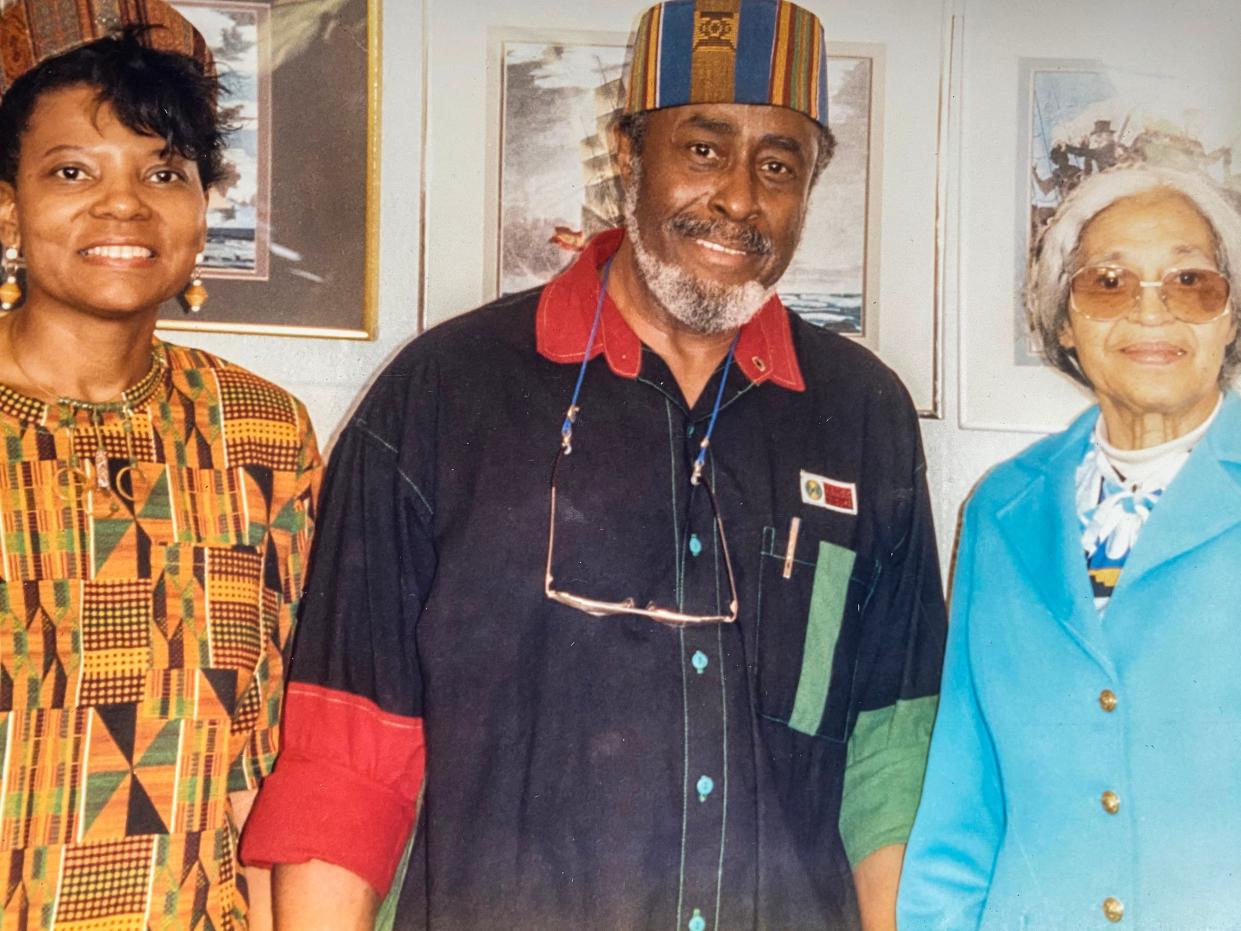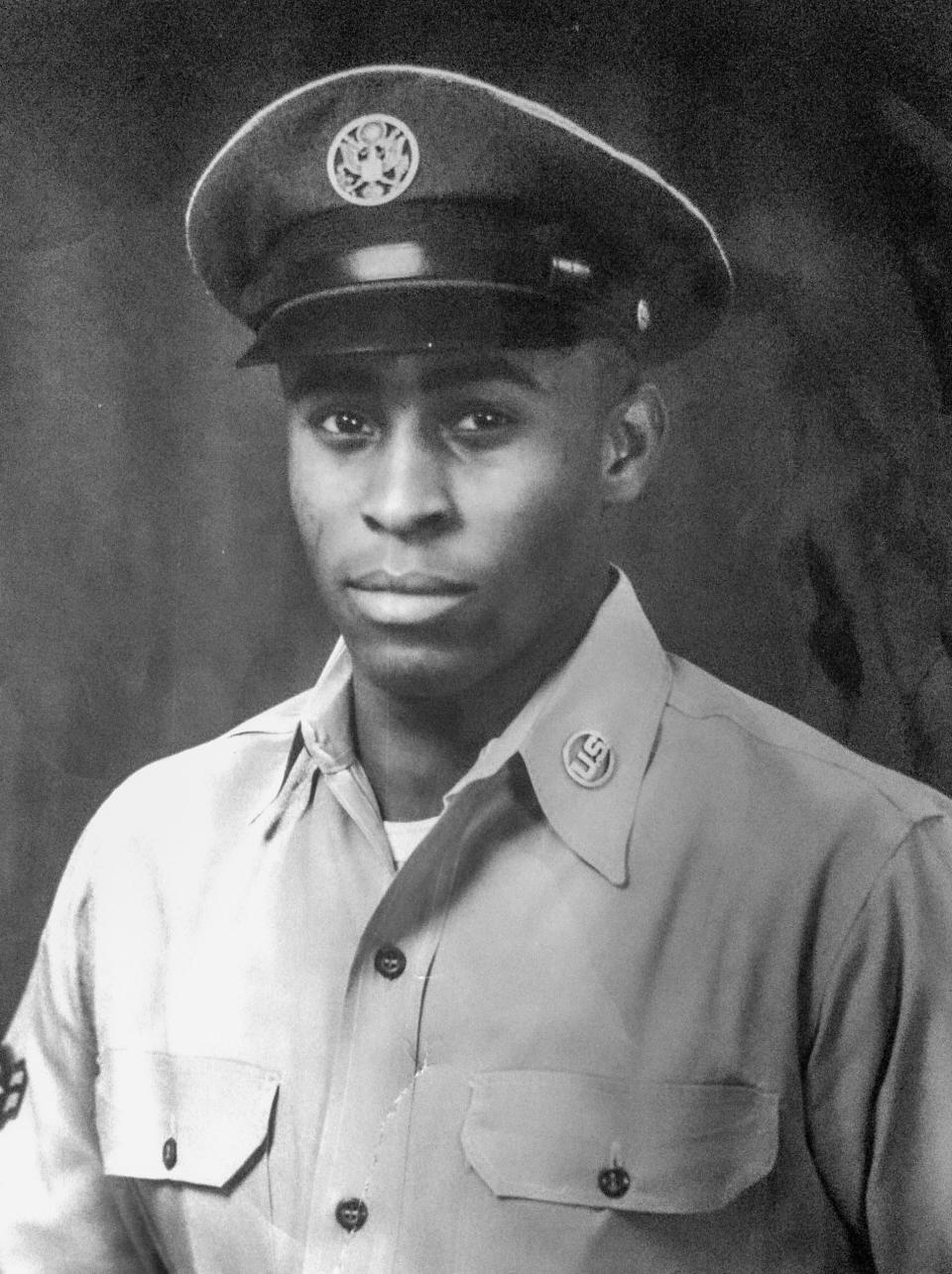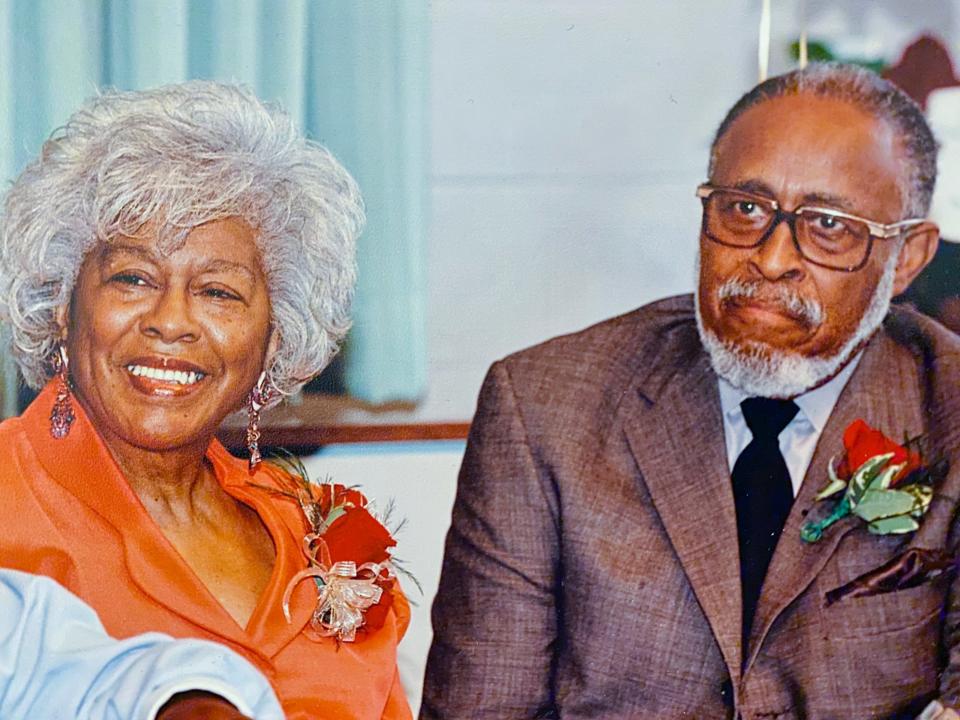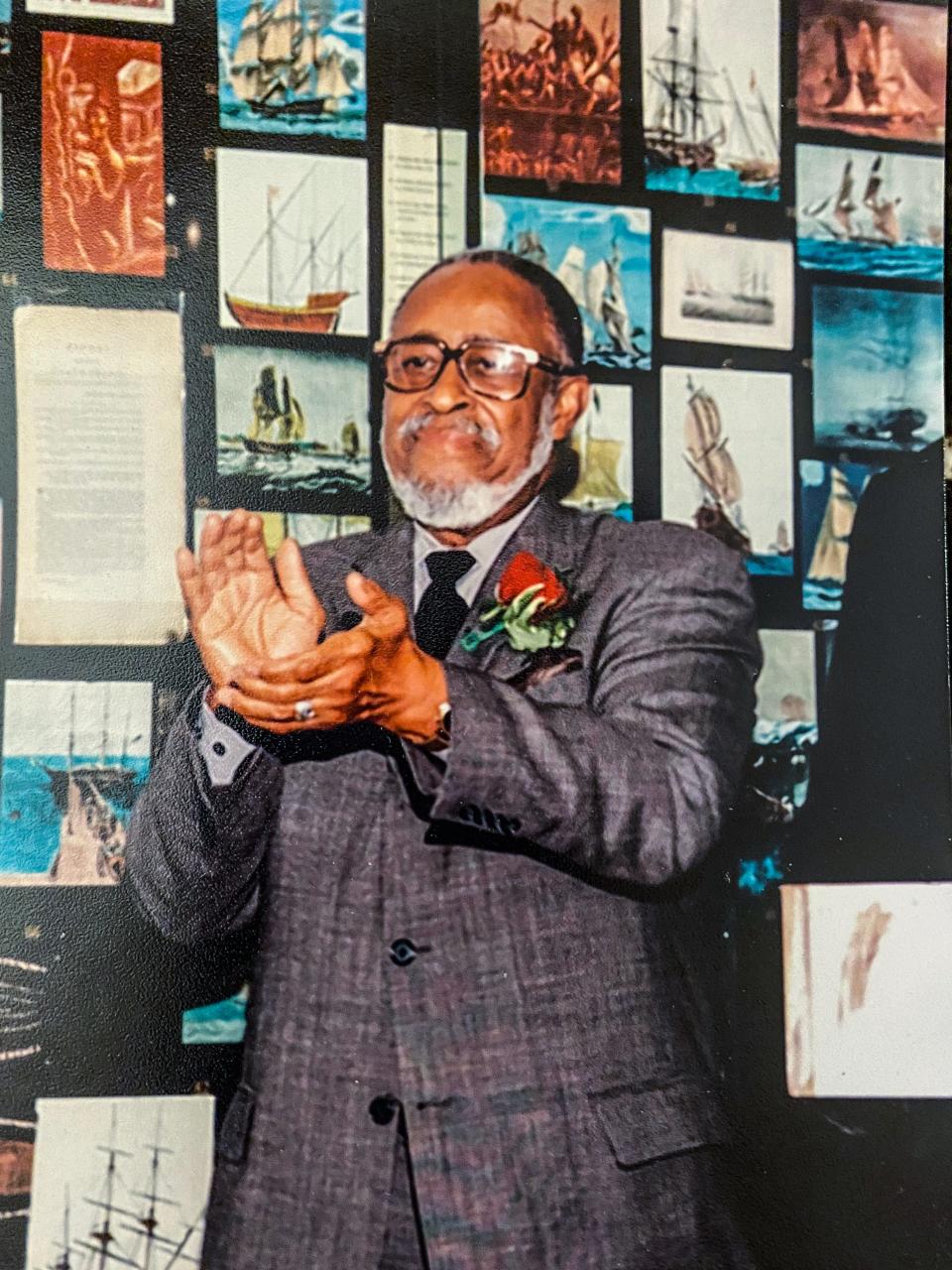With strong connection to Martin Luther King Jr., Detroit man says Movement is alive today

- Oops!Something went wrong.Please try again later.
When Dr. Robert O. Bland is asked about important moments in his life, he sometimes pauses to collect his thoughts, which is not surprising given the richness of events he has experienced during his nearly 90 years of living.
However, when Bland was recently asked to estimate the number of books collected within the vast library at his northwest Detroit home there was no hesitation, as the number “2,000” was spoken in a soft but definitive tone. And then came the pause. It was a clue that the conversation had touched on a subject that is of the utmost importance to the longtime Bagley community resident.
“Reading is critical,” said the 89-year-old Bland, who was born in Lexington, Kentucky, and came to Detroit with family members when he was 16. “We grow through reading, and it is an activity and experience that we should give ourselves not only in our spare time, but we should make time.”
As Monday’s Martin Luther King Jr. Day holiday approaches, any listing of resources within the city of Detroit where more can be learned about the civil rights icon, Nobel Peace Prize recipient and famed orator would not be complete without including Bland’s home library, which he believes contains all of King’s published writings. But more than containing dates and details about key events that took place decades ago, Bland says the pages of the books represent a vision and spirit that live on today.
“I read his books, I have all of them in our library, and I believe Dr. King was very necessary to the United States because he brought a kind of leadership to bring about the equity that we should have had,” Bland said from his home on Tuesday. “Dr. King brought integrity to the movement and through his actions he showed what it means to be committed to making society better. But the movement is still alive today. Such a movement does not die and cannot die because many of the same problems during Dr. King’s life are still with us.”
The youngest of 10 children born to Edward Bland and Arsyner Calloway Bland, Robert Bland said the teenage version of himself that arrived in Detroit already felt connected to a movement.
“I was raised to be conscious, not only about the suffering of Black people, but also about the contributions of Black people to the development of this country and Western civilization,” said Bland, a graduate of Eastern High School (Class of January 1952). “We (Black people) should be proud of ourselves for the things we have accomplished and the things we will accomplish and know that we have been involved in history from its beginning. We must continue to tell that story.”
Anytime Bland speaks about the contributions of Black people to America and the world, he also is including the contributions of African Americans in the military, a legacy he is a part of through four years of service in the Air Force, including some of the years when the Korean War was waged. For Bland, it was not only an opportunity to proudly serve his country, but it also was a time he spent strengthening himself as a person.

“My heavy reading started when I was stationed in the Air Force in Japan,” said Bland, who was an airborne radio operator during a stretch of his Air Force stint, which required him to use Morse code skills that he had first learned as a Boy Scout. In Japan, Bland also took classes during the evening and on the weekends at Sophia University in Tokyo. And his spiritual nourishment during those years consisted of reading the Bible “from cover to cover.”
However, the voracious reader also found time to do some special writing while in the Air Force in the form of letters to the then-Matilda Jones, who was a member of Greater Macedonia Baptist Church (located at Mack and Maxwell), whose pastor, the Rev. H. H. Coleman often hosted the Rev. Martin Luther King Sr. during his visits to Detroit from Atlanta. Around this time, the church had a strong community presence and news of important happenings, such as visits from King Sr., were often reported in the Detroit Tribune. Nonetheless, judging from the description of his letter writing during that period, there was no member of the church more important to Bland than Jones.
“My letters would be two or three pages, and her letters back to me would be one page, or sometimes two,” said Bland, who made himself laugh with that statement. But the nature of the couple’s relationship has never been a joke. When Bland was honorably discharged from the Air Force in September 1956, the couple's courtship would continue, eventually leading to a marriage, which the couple has celebrated for the past 65 years.
In Matilda, Bland also found a life partner who shared his admiration and respect for Martin Luther King Jr., which the couple displayed on June 23, 1963, during the Detroit Walk to Freedom, the largest civil rights demonstration in U.S. history at the time until the March on Washington two months later
“My wife and I decided that we had to go,” Bland recalled about the Detroit march down Woodward Avenue, which called attention to injustices in the North and South, including segregation; brutality against civil rights activists; and inequalities in hiring practices, wages, education and housing. “We believed in what Dr. King was saying and our oldest child, Stephen, was just 2 or 3 and we took him with us.”
The Blands were among about 125,000 people that attended the Detroit Walk to Freedom, where King delivered a version of his “I Have A Dream” speech for the first time. However, three years later, Bland would have a much more intimate encounter with the man he so deeply admired when King accepted an invitation to speak at an annual Men’s Day event in October 1966 at New Bethel Baptist Church, led then by the legendary Rev. C.L. Franklin. A then-young deacon at Greater Macedonia Baptist Church, which had a close connection with New Bethel, Bland had the honor of being a part of a small welcoming party that was asked to meet King at Detroit Metro Airport. As Bland described the scene from roughly 57 years ago, he said he will “never forget” that the plane stopped at an earlier than normal point on the runway to let King off to ensure that the necessary security detail was around him. Despite the vivid indicator of the danger surrounding King at that point of his life, Bland said the moment for him was nothing less than inspiring.

“I felt so blessed and honored to meet him personally and have chats with him as we headed to the terminal before taking him to his quarters,” said Bland, who recalled the late Horace Sheffield Jr., a couple of UAW executives and a representative from New Bethel as being the other members of the welcoming party.
Just as Bland clearly remembers the moment with King at the airport, he says he will never forget how he felt about two years later when he heard the news that King had been assassinated on April 4, 1968.
“It hurt me deeply, but I recommitted myself to doing more and making sure I paid my dues,” Bland explained. “I’ve spent the rest of my life, up to this day, trying to do things to help Black people and to help our society. To this day, I continue to be a part of our movement.”
Using the education he obtained in Michigan after returning from the Air Force, including a bachelor’s degree in history from the Detroit Institute of Technology, a master’s degree in education from the University of Detroit and a doctoral degree in educational leadership from the University of Michigan, Bland worked in positions where he was able to help Detroit students and also assist Detroit schools to work more effectively with the community, including families. But on Tuesday, he was more interested in talking about some of his neighborhood volunteer activities that brought him joy, such as teaching the finer points of baseball to kids that played in the Northwest Junior Athletics Little League and assisting Boy Scout Troop 163, which used to meet at Mayflower Congregational Church.

“I felt obligated to do that, not just for my children, but for other children in the neighborhood and their kinfolk,” said Bland, who, along with Minister Matilda Bland, are parents to three adult children (Stephen, Susan and Ralph), as well as the grandparents of three.
At the same Mayflower Church where the Boy Scouts met, Bland also had an experience when his ability to improvise came in handy when he was required to “pinch-hit” for a missing cook and served a fish and spaghetti meal to a party of about 80, which included another civil rights icon, Rosa Parks, and high school students from the South that Parks was introducing to Detroit during the 1980s.
“Helping Mrs. Parks was a high point in my life,” said Bland, who also hosted students selected by Parks at the Lewis College of Business, where he was vice president.
As of Tuesday, Bland was unsure of who he will be sharing his company with on the holiday, outside of his immediate family. But the chairman of the Detroit Council of Elders is not without a plan to both build on his knowledge of King’s life and then share it with others.
“On Monday, I’m sure I will make time to read,” Bland said. “And I also will make time to talk to friends and family and neighbors about the life of Dr. Martin Luther King because we owe him a debt. More than just remember him on Monday, we have to continue what he started. That is our work and our task.”
Scott Talley is a native Detroiter, a proud product of Detroit Public Schools and lifelong lover of Detroit culture in all of its diverse forms. In his second tour with the Free Press, which he grew up reading as a child, he is excited and humbled to cover the city’s neighborhoods and the many interesting people who define its various communities. Contact him at: stalley@freepress.com or follow him on Twitter @STalleyfreep. Read more of Scott's stories at www.freep.com/mosaic/detroit-is/.
This article originally appeared on Detroit Free Press: Detroit man, 89, says Movement led by Martin Luther King still alive

